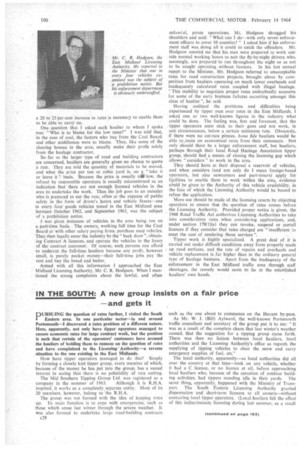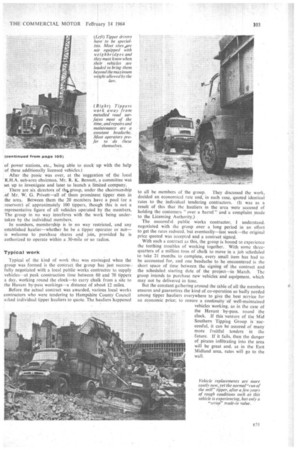IN THE SOUTH: A new group insists on a fair price —and gets it
Page 102

Page 105

If you've noticed an error in this article please click here to report it so we can fix it.
PURSUING the question of rates further, I visited the South 1 Eastern area. In one particular sector—in and around Portsmouth—I discovered a rates problem of a different nature. Here, apparently, not only have tipper operators managed to ensure economic rates for large contract work, but the position is such that certain of the operators' customers have accused the hauliers of holding them to ransom on the question of rates and have complained to the Licensing-Authority—a reverse situation to the one existing in the East Midlands.
How have tipper operators managed to do this? Simply by forming a closely knit tipper group, every member of which, because of the money he has put into the group, has a vested interest in seeing that there is no pasibility of rate cutting.
The Mid Southern Tipping Group Ltd. was registered as a company in the summer of 1963. Although it is R.H.A. inspired, it works as a completely separate entity. Most of its 20 members, however, belong to the R.H.A.
The group was not formed with the idea of keeping rates up. Its main function is to cope with emergencies, such as those which arose last winter through the severe weather. It was also formed to undertake large road-building contracts e2,8 such as the one about to commence on the Havant by-pass.
As Mr. W. J. (Bill) Aylward, the well-known" Portsmouth traffic consultant and secretary of the group put it to me: "It was as a result of the complete chaos that last winter's weather caused, that the suggestion for a tipping group came forth. There was then no liaison between local hauliers, local authorities and the Licensing Authority's office as regards the supplying of tipping vehicles to clear the snow and carry emergency supplies of fuel, etc."
The local authority, apparently—as local authorities did all over the country at that time—took on any vehicle, whether it had a C licence, or no licence at all, before approaching local hauliers who, because of the cessation of outdoor build ing activities, had tippers standing idle in their yards. The sam4 thing, apparently, happened with the Ministry of Transport. The South Eastern Licensing Authority granted dispensation and short-term licences to all comers—without contacting local tipper operators, (Local hauliers felt the effect of this indiscriminate licensing during last summer, as a result of power stations, etc., being able to stock up with the help of these additionally licensed vehicles.) After the panic was over, at the suggestion of the local R.H.A. sub-area chairman. Mr. R. K. Bennett, a committee was set up to investigate and later to launch a limited company.
There are six directors of thc,,group, under the chairmanship of Mr. W. G. Privett—all of them prominent tipper men in the area. Between them the 20 members have a pool (or a reservoir) of approximately 100 tippers, though this is not a representative figure of all vehicles operated by the members. The group in no way interferes with the work being undertaken by the individual members.
In numbers, membership is in no way restricted, and any established haulier—whether he be a tipper operator or not— is welcome to purchase shares and join, provided he is authorized to operate within a 30-mile or so radius.
Typical work
Typical of the kind of work that was envisaged when the group was formed is the contract the group has just success-, fully negotiated with a local public works contractor to supply vehicles--at peak construction time between 60 and 70 tippers a day, working round the clock—to carry chalk from a site to the Havant by-pass workings—a distance of about 12 miles.
Before the actual contract was awarded, various local works contractors who were tendering to Hampshire County Council asked individual tipper hauliers to quote. The hauliers happened
to all be members of the group. They discussed the work, decided an economical rate and, in each case, quoted identical rates to the individual tendering contractors. (It was as a result of this that the hauliers in the area were accused of holding the customers "over a barrel" and a complaint made to the Licensing Authority.)
The successful public works contractor, I understand, negotiated with the group over a long period in an effort to get the rates reduced, but eventually—last week—the original price quoted was accepted and a contract signed.
With such a contract as this, the group is bound to experience the teething troubles of working together. With some threequarters of a million tons of chalk to move in a job scheduled to take 21 months to complete, every small item has had to be accounted for, and one headache to be encountered is the short space of time between the signing of the contract and the scheduled starting date of the project—in March. The group intends to purchase new vehicles and equipment, which may not be delivered in time.
But the constant gathering around the table of all the members ensures and guarantees the kind of co-operation so badly needed among tipper hauliers everywhere to give the best service for an economic price; to ensure a continuity of well-maintained vehicles working, as in the case of the Havant by-pass. round the clock. If this venture of the Mid Southern Tipping Group is "successful, it can be assured of many more fruitful tenders in the future. If it fails, then the danger of pirates infiltrating into the area will be great and, as in the East Midland area, rates will go to the wall.
















































































































































































